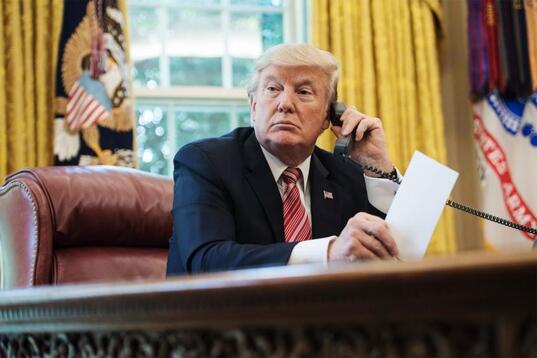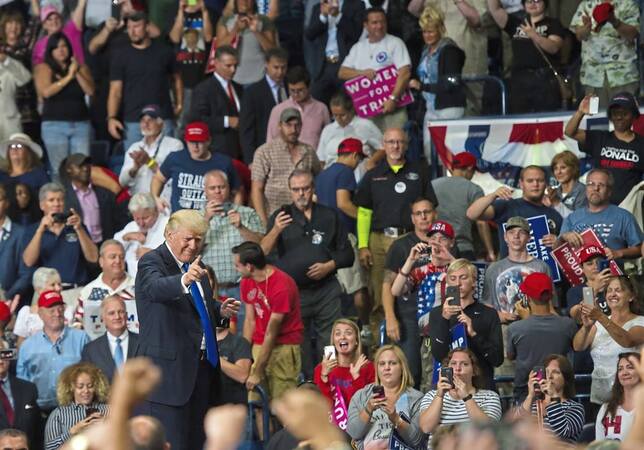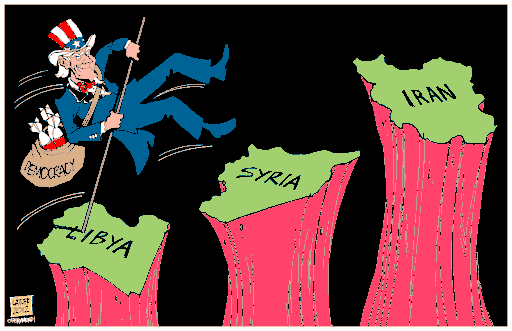|
The connection between the authoritarian personality and the working class began in earnest in the 1950s with cold war political sociologist Seymour Martin Lipset. Lipset argued that since World War I, “working class groups have proved to be the most nationalistic and jingoistic sector of the population” [1959: 483.] His concept of authoritarianism is a mash-up Adorno’s ideas mixed with support for “extremist” groups like the Jehovah’s Witnesses and the Communist Party. Lipset argued that in the US, the working class authoritarianism poses a threat to democracy. The question is: does the psychology of individuals in the working class explain Trump’s rise to power? A Marxist perspective reveals the flaws in this and other individual-level psychological explanations:
Upper class benevolence is a bourgeois fantasy. Despite its obvious flaws, the psychological argument has a special appeal for members of the privileged class, who want to hold themselves blameless for the social ills around them. They believe they knew better, and they blame the working class to avoid facing up to their own culpability. Scapegoating the working class is known as the “myth of upper class benevolence.” One classic study in race and ethnicity shows the fallacies in the myth of upper class benevolence and zeroes in on the ways the working class is often portrayed, incorrectly, as the source of white supremacy. In his book The Mississippi Chinese: Between black and white, the sociologist James Loewen interviewed hundreds of residents of the Mississippi Delta. He found upper middle class whites routinely blamed poor working class whites for any and all oppression of both African Americans and Chinese Americans. But looking closely at the facts gave Loewen a much different picture of culpability. It was the privileged planter- and business-class whose members had the power to keep Chinese- and African-Americans out of their neighborhoods, schools, and workplaces. Working class organizations like the American Legion, Veterans of Foreign Wars, and small Baptist churches were the first to welcome people of color, while upper class organizations like the Chamber of Commerce, the Rotary Club, and Episcopalians excluded them. Financial institutions acted in the interests of the privileged class and served to limit opportunities for others. Schools reserved for whites only were resource rich compared with schools that served people of color. One county in Mississippi, Loewen discovered, actually spent $45 per white pupil for every $1 per African American pupil. Loewen rejects the widely held belief, echoed in the London Business School study mentioned earlier, that the working class, fearing economic competition, feels the most prejudice. Instead, he turns to the pioneer Marxist sociologist of race, Oliver C. Cox, who argued that to analyze racial dynamics one needs to look first at “the economic policies of the ruling class.” Cox continued, “Opposition [by the working class] to social equality has no meaning unless we can see its function in the service of the exploitative purpose of this [ruling] class.” A working class divided by race is easier to controlA working class divided by race is easier to control and to keep unorganized than a united one, so concerted and deliberate efforts are made to encourage members of the working class to embrace authoritarian beliefs, especially white supremacy. Using corporate-funded think tanks, right-wing radio and cable television, and presidential pronouncements, the ruling class frames current events in authoritarian terms, attempting to undermine the unity of the working class and therefore weaken it. In Mississippi Loewen found that alliances between working class whites and blacks were viciously undermined and blocked by the powerful of the community. Likewise, people who challenge class oppression and racial hierarchies are singled out for condemnation and retaliation. Newer research on intolerance shows furthermore that authoritarian beliefs are not clearly associated with membership in the working class, defined by wage dependence, low income, and job insecurity. Erasmus University sociologist Dick Houtman revisited Lipset’s theory of working class authoritarianism found that it is not class that is correlated with intolerance, but educational level and access to cultural opportunities like books, concerts, and art exhibitions. Thus another way that the ruling class tries to divide the working class is by limiting their educational opportunities. Donald Trump once famously intoned, “I love the poorly educated.” Along with his secretary of education Betsy DeVos, Trump seems intent on increasing their ranks. With working class pupils forced to attend substandard, unsafe and under-resourced schools year after year, with college costs putting post-secondary education out of reach of many, and with crippling student debt for those who do borrow for college, the ruling class aims to limit the critical thinking resources the working class needs to challenge ruling class propaganda. For those who are in college, corporate forces have developed special interventions to encourage neoliberal and fascist accommodation. The Charles Koch Foundation, established by the head of Koch Industries, has implemented a $50 million, 32-state strategy establishing institutes, holding conferences, and funding faculty and graduate students in a concerted effort to influence policy rightward: toward denial of climate science, undermining of labor rights, and revision of history in favor of business interests. Hand in hand with these corporate forces are the white supremacist organizations that pay for speakers to visit campuses and foment hate, then cry “first amendment” when students object. Other corporate-sponsored organizations encourage students to record, expose and protest faculty who do not espouse conservative views. In short, the psychological argument claims that authoritarian tendencies emerge from working people themselves. It’s no surprise that researchers from a business school embraced that idea, because it is what Marx and Engels refer to as a “ruling idea.” By pretending that authoritarian ideas arise organically from the working class itself, it hides the relationship between authoritarianism and the economic policies of the ruling class. In contrast, a Marxist analysis recognizes the congruence between authoritarian ideas and the economic interests of the corporate ruling class, especially its efforts to divide the working class by race, gender, citizenship status, etc. It recognizes the influence of powerful corporate forces which intentionally try to persuade workers to blame each other for their oppression, instead of the capitalists who profit from their lack of unity. Citations Adorno, Theodor et al. 1950. The Authoritarian Personality. New York: Harper. Edsall, Thomas B. 2017. “The Trump Voter Paradox” The New York Times. 28 September. https://www.nytimes.com/2017/09/28/opinion/trump-republicans-authoritarian.html Ferris, Robert. 2017. “Why voters might be choosing dominant, authoritarian leaders around the world.” CNBC, 12 June. https://www.cnbc.com/2017/06/12/why-voters-might-be-choosing-dominant-authoritarian-leaders-around-the-world.html Jacobs, Tom. 2018. “Inside the minds of hardcore Trump Supporters” Pacific Standard. February 15. https://psmag.com/news/inside-the-minds-of-hardcore-trump-supporters Lipset, Seymour Martin. 1959. “Democracy and Working-Class Authoritarianism.” American Sociological Review 24 (4), 482-501. Loewen, James. 1988. The Mississippi Chinese: Between black and white. 2e. Prospect Heights, IL: Waveland Press. Serwer, Adam. 2017. “The Nationalist’s Delusion.” The Atlantic. November 20. Image: Trump addresses the Conservative Political Action Conference in 2015. Greg Skidmore/Creative Commons AuthorAnita Waters is Professor Emerita of sociology at Denison University in Granville, Ohio, and an organizer for the CPUSA in Ohio. This article was first published by CPUSA.
2 Comments
With the latest attack from Trump on the US postal services for the sake of voter suppression, the outrage from the democrats has been at an all-time high since the epoch of the great Russia Gate conspiracy. The difference is that now, unlike Russia Gate, this attack on the post office is something real and worth worrying about. The post office is one of the few and great public services of our country, and any attack on it should be fought against ferociously. The main concern of this work is on the reaction by most democrats to these attacks by Trump, and specifically on what precisely it is that they are outraged by. To the naked eye the reaction of outrage is the natural result of a clear case of voter suppression and hindrance of our democratic process. To be fair, it might genuinely be the case that many democrats are really outraged at this monstrosity; at the end of the day, it is truly a monstrosity. But in terms of the democratic establishment, the discontent comes not in the action itself, but in the image the action portrays. Essentially, how the action destroys what has been a bipartisan effort to create the illusion of democracy, revealing the truly undemocratic character of our society. The most drastic change the Trump administration has brought to the US has not been the brutal treatment of immigrants, the fascistic use of the state’s instruments of violence on protestors, the imperialist and regime change policy, or the complete lack of regard of the interest of the mass of Americans; all those things are quite old and hence were already there before him. Policy wise his government has been indistinguishable from any administration of the last four decades of Neoliberal rule. So, what has the democrat's outrage really been about? Well the answer lays in the mask, and not the one used by Jim Carrey. The mask has been ideologically the most essential tool in the development of our country. The mask is the ideological justification for the about-to-be or already-committed atrocities. Whether it is the mask of “civilizing the Indian savage”, “enslaving the inferior blacks”, “preventing the spread of communism”, or promoting the “spread of democracy while fighting terrorism”, the mask is how we have been able to convince the populace to accept the atrocities we will commit; whether it is the genocide of the native, enslavement of blacks, or the brutal imperialist expansion into the global south and middle east. In any case, the mask has been the security of the ruling classes of our country since its founding, without it their hegemonic rule, which allows them to commit all the crimes they want to continue capital accumulation, would begin to shatter. Thus, what scares democrats is not actually any of the policies Trump is proposing, hell, most of them has been approved by the democrats themselves; their real fear is the how Trump is doing all these things. It is in the question of the how that we find the real answer to their outrage, whether of this latest event or any other event of the last three years of his administration. The real problem we must attack, if we consider ourselves proponents of democracy, is not merely the last three years of Trump, but rather the accumulation of previous administrations that took us to the point of having a Trump - while now telling us that all the problems started with Trump. More than attacking Trump, something so simple a child could do, we must attack a democratic establishment who has abandoned workers the last 4-5 decades of Neoliberal policies; leaving working class Americans with such a feeling of abandonment that they see their only hope in the fake right wing populism Trump represents. If we consider ourselves proponents of democracy, of a government of and by the people; then unlike the democrats want us to believe, the attack on American democracy did not start three years ago. The attack itself is inexistent, because for there to be an attack on democracy there must exist a democracy to be attacked; and I’m sorry to break it to you, but having the opportunity to vote every two years for puppets chosen by the ruling elites of our country is not democracy. A slaves opportunity to choose his master does not change his status as a slave, so that our opportunity to elect different factions of the ruling elite of our country does not change the fact that at the end of the day you are voting for elite backed candidates who only care about you when it is time for you to vote, and whose interest lay in those factions of the ruling class that funded their campaigns. If we really are proponents of democracy, we must reject the current concept of democracy we are used to in this country. We must realize that what we have is “democracy for the insignificant minority, democracy for the rich”[1], and that in essence “to decide once every few years which member of the ruling class is to repress and crush the people through parliament”[2] is in no way, shape, or form actual democracy. What we have now for the mass of Americans is a dictatorship of the class who owns the means of production, the media, the politicians, and who has created every structure in society to make you think that democracy for them is equivalent to democracy for you. Anyone who truly believes in democracy must reject this for a democracy of the majority, a democracy where people actually feel like they are contributing to the creation of the world around them and not participating blindly in forces that where already present there before they arrived. If we really uphold the constitutional values of a democratic government of and by the people, we must actively struggle against the imposition of this democracy for the few. We must struggle to build a country were politicians aren’t funded by special interest making each election predictable through an analysis of who got more money from the elites, and where democracy and participation isn’t just an event every two years where we get a nice sticker for partaking in it. We must realize that when working man and women around the country wake up for their 9-5 jobs, they are experiencing the hand of tyranny for most of their day. At their workplace they are subject to the will of the person who owns where they work. And even though these working man and women are the ones who create all the wealth of our country, they have essentially no say in their work. They have no participation in how they produce, what they produce, and what happens to what they produce. They are a part, like any other machine, in the process of the accumulation of capital. In essence, at work, this period where most Americans spend most of their life, what they experience is not democracy, but the tyranny of their boss. Thus, when it comes to the democrats outrages of Trump, let us not be fooled. What bothers them is not itself the voter suppression whose goal the attack on the USPS represents, but how obviously un-democratic it is. But, un-democratic in what sense? If we have already established that there is no real democracy for the mass of Americans. Well, it is undemocratic in that it thwarts the process of the illusory democratic process of the masses, which in reality is the game by which the different factions of the ruling elites play house and decide who will be the face of the shitshow for the next few years. What bothers the democrats is not the un-democraticness itself, but how it destroys even the fake democratic veil previously held up to cover the dictatorship of capital. Their problem is not really with Trump’s attack being undemocratic, if that was really the case they would be trying to abolish the basically legal bribe mechanism that came with Citizens United, or trying to expand democracy at work through promotion of union membership or cooperative worker owned businesses. None of these things are promoted by them because they represent the potential of democracy for the many, the biggest threat to their democracy of the few. Thus, their real problem is with the unapologetically un-democraticness of Trump’s actions; because to them it is most importantly an attack to the legitimacy of their mask, both nationally and internationally.
The struggle of the democrats against Trump over the last three years has not been one fought in the arena of matter but in the arena of form. What bothers them about Trump is not what he actually does (matter), but how it is that he does it (form). Thus, although we do have to struggle against the un-democratic actions of the current administration; we must primarily struggle against those who have for many years done the same in the dark, and when now it is done in the light they fight to bring it back to the dark. Our struggle cannot just be against the symptom which Trump represents, but against the totality of the illness itself; in order to then actually destroy it at the root and prevent any worst symptoms from appearing. In essence, if you really are disgusted by the Trump administration, your fight must also include those who actively created the conditions for that administration to emerge. If what disgusts you about Trump is the material, the actual policies and what he does, not just how; then your answer is not in changing the form but maintain the content. This means that your answer is not in Joe Biden or anyone else in the democratic establishment. Your answer to the Trump phenomena, if what he is doing is what bothers you, is to fight against the whole system itself. Not just because it was the system that brought about Trump, but because everything that is despicable in the material of Trump is identical to every other administration the system has produced, and the removal of it is not in the return to the mask, but in the destruction of the whole head in which the mask is put on and removed. The Trump phenomena seems to have divided the traditionally organized ruling classes of our country. The answer from us must be to capitalize on their weakness and on the chaos being produced by the pandemic and organize ourselves. We must organize ourselves towards destroying this hidden fetter which maintains us in the shallow democracy of a few and tyranny for the many. This hidden fetter is our economic system. A system that has as its only condition the accumulation of capital by any means necessary; and which to maintain its tyrannical rule it has created the illusory mask of democracy. The mask which democrats today are fighting endlessly to put back on; knowing very well that without it their mass blinding hegemony, both nationally and internationally, will begin to crumble. Something which I believe we are already witnessing. [1] V.I. Lenin, The State and Revolution (Foreign Language Press, 1970), 74. [2] Ibid., 38. |
Details
Archives
July 2024
Categories
All
|





 RSS Feed
RSS Feed